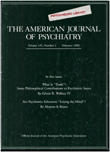Psychotic syndromes in epilepsy
Abstract
Claims have been made that epilepsy is associated with both brief psychotic episodes and persistent psychotic states. The existence of brief, nonconfusional psychotic episodes in epilepsy has received some formal support; these may be a function of temporal lobe subictal activity. Persistent psychosis is found in about 7% of patients with epilepsy; independent evidence indicates this to be a significant association. Temporal lobe seizure activity, again probably acting subictally, may be involved in the pathogenesis of these states, perhaps in interaction with other factors. Occurrence of psychotic syndromes in epilepsy may be relevant to kindling, atypical psychoses unrelated to epilepsy, and the psychotropic effect of carbamazepine.
Access content
To read the fulltext, please use one of the options below to sign in or purchase access.- Personal login
- Institutional Login
- Sign in via OpenAthens
- Register for access
-
Please login/register if you wish to pair your device and check access availability.
Not a subscriber?
PsychiatryOnline subscription options offer access to the DSM-5 library, books, journals, CME, and patient resources. This all-in-one virtual library provides psychiatrists and mental health professionals with key resources for diagnosis, treatment, research, and professional development.
Need more help? PsychiatryOnline Customer Service may be reached by emailing [email protected] or by calling 800-368-5777 (in the U.S.) or 703-907-7322 (outside the U.S.).



